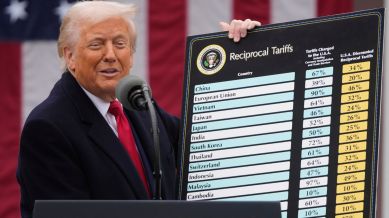Trump says US has secured $17 trillion in new investments, but figure appears far lower: report
The White House said the president’s use of tariffs and direct talks with foreign leaders had led to major commitments.

US President Donald Trump has claimed that his economic policies have generated $17 trillion in new investments, though available data and company statements suggest the real number is much smaller.
“Under eight months of Trump, we’ve already secured commitments of $17 trillion coming in,” the president said in a speech last month. “There’s never been any country that’s done anything like that.”
monthly limit of free stories.
with an Express account.
But according to the Associated Press (AP), the White House website lists a total of $8.8 trillion in investment commitments and some of those appear to come from projects first announced under former President Joe Biden. The White House has not explained how Trump arrived at the $17 trillion figure despite repeated requests.
“Meaningful increase, but not trillions”
Adam Posen, president of the Peterson Institute for International Economics, told AP that the announcements represent a “meaningful increase” but are closer to hundreds of billions, not trillions. He warned that Trump’s pressure tactics could discourage future investment.
“It is a national security mistake because you’re turning allies into colonies of a sort,” Posen said. “Twisting the arms of governments to then twist the arms of their own businesses is not going to get you the payoff you want.”
Trump banking on foreign investment pledges
The White House said the president’s use of tariffs and direct talks with foreign leaders had led to major commitments. Spokesman Kush Desai told AP, “The difference between hypothetical investments and ground being broken on new factories and facilities is good leadership and sound policy.”
The White House said Japan plans to invest $1 trillion, the European Union $600 billion, the United Arab Emirates $1.4 trillion over ten years, Qatar $1.2 trillion, Saudi Arabia $600 billion, India $500 billion and South Korea $450 billion.
However, AP found that many of these figures are uncertain, lack public details or appear inflated. For example, Qatar’s $1.2 trillion pledge is more than five times its entire annual GDP. South Korea also disputes the White House’s claim that it will invest $450 billion, saying its actual commitment is around $350 billion.
Jared Bernstein, who chaired the Council of Economic Advisers under Biden, told AP, “From what I’ve seen, these commitments are worth about as much as the paper they’re not written down on.”
“Tariffs played a big role”
The White House argues that Trump’s new tariffs, imposed on imports such as kitchen cabinets and pharmaceuticals, are key to forcing companies to invest in the US.
Pfizer CEO Albert Bourla told AP, “The president was absolutely right. Tariffs is the most powerful tool to motivate behaviours.”
Trump agreed, saying, “The tariffs played a big role.”
So far, economists told AP there is little sign that business investment has grown as a share of the US economy. Some of the investments Trump cited such as those by chipmakers GlobalFoundries and Micron were largely announced during the Biden administration and supported by the 2022 CHIPS and Science Act.
A September AP-NORC poll found that 37% of US adults approve of Trump’s handling of the economy, down from 56% during his first term in 2020.